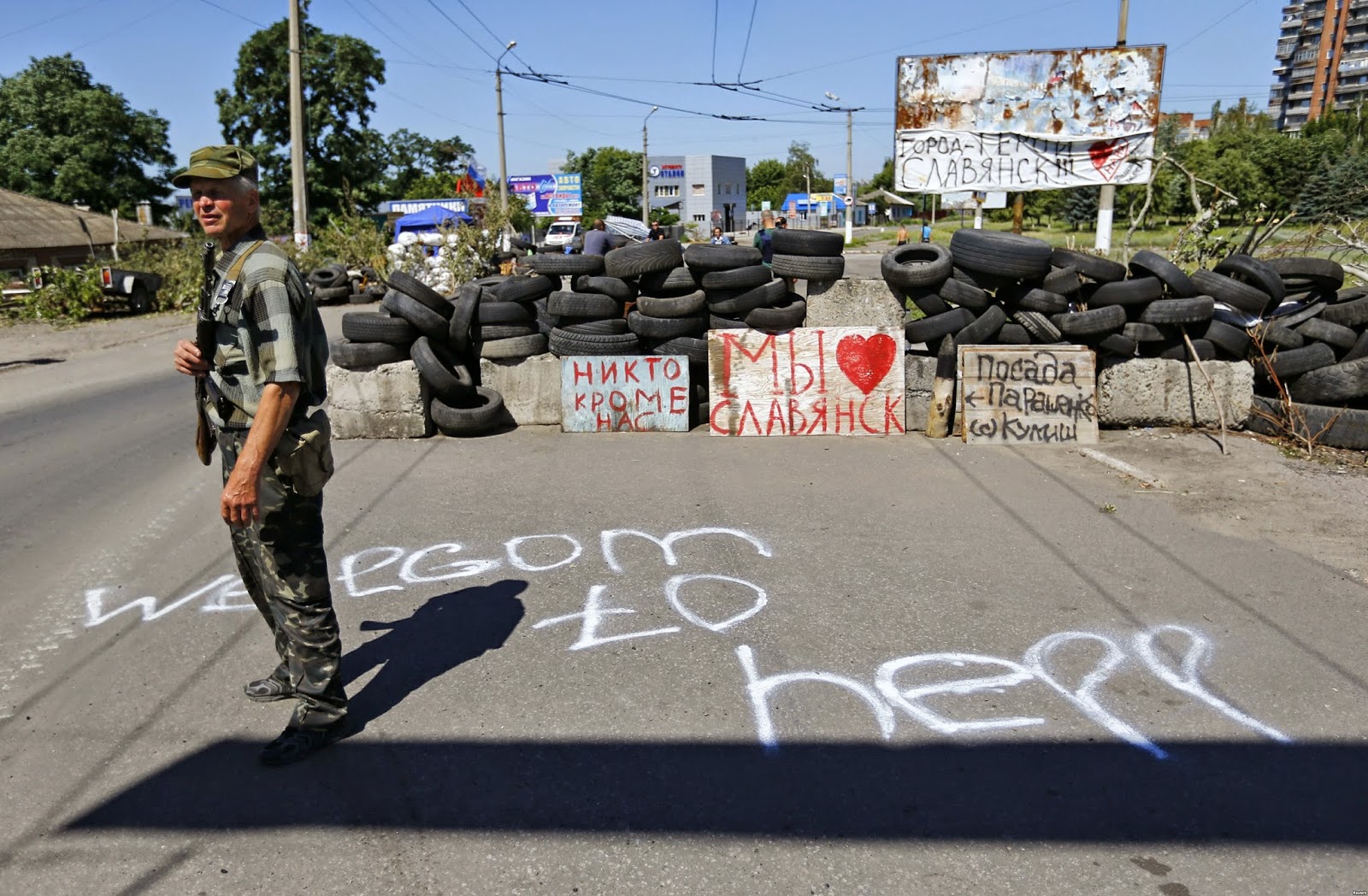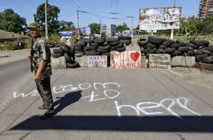Laced with dark humour, vivid accounts of nights spent in cellars and intermittent power and water shutoffs, the book has won critical acclaim in Russia, where it was published last month.
"These entries are still fresh, but they already breathe a sense of history," wrote the Trud daily.
"Donbass Diary is a book without anything made up, leaving no doubt of its truthfulness, a document of special significance," wrote the weekly Argumenty Nedeli.
The diarist's identity is a mystery, as she used the pen name Yana Kovich (apparently a play on the name of Ukraine's toppled pro-Russian president Viktor Yanukovich).
She names her town only as Y., but it seems to be Yenakiyeve, just outside the main rebel-controlled city, Donetsk.
In a message sent to AFP via the publisher, Limbus Press of St Petersburg, the writer declined to answer questions, saying: "All that I can say and want to say, I said in the book."
The intensely personal book stands out among an avalanche of titles on the Ukraine conflict coming out in Russia, most of them ideological tracts.
Several accounts of the conflict published in Kiev include the recent "Airport", a novel based on the battle for Donetsk airport by Los Angeles Times correspondent Sergei Loiko, who spent time embedded with Ukrainian troops.
- 'We won't leave' -
The book -- whose cover is stylised as a taped-up window -- explores the change in values brought about by the conflict in Donbass, a gritty coal mining region once also known for international footballers and flashy nightclubs.
"I don't dream about getting a Land Cruiser any more. They burn up just as quick as a Lada when they're hit by a shell," reads one entry.
"It's not cool anymore to have a flat, a car, or a nice phone -- it's cool to have a cellar."
Other entries talk about the new normal in a conflict zone -- such as how identifying weapons from the sounds they make has become second nature.
"If you hear vzhikh-vzhikh-vzhikh, that's only a Grad (rocket). If it's "u-ukh", a shell just flew over your house."
The book is clearly anti-Kiev.
"The 'Ukrs' really want to blow up all our systems to get rid of the inhabitants, but we won't leave. Here's a big fat 'up yours' from our cellar!" says one entry, using a derogatory term for Ukrainian troops.
It describes people left to fend for themselves in war conditions, risking death by simply staying put.
"You will have Grad rockets aimed at you, but don't let that scare you: it's just a tactic: they're here to protect you," reads one ironic entry.
While some 2,000 Ukrainian troops have died, the death toll among separatist fighters and civilians in the region is around 5,000.
The diary runs from August 1 last year to March 3, just before the Minsk peace deal brought in a much-breached ceasefire.
"When the war ends, I'll walk round the town and hug people, trees, buildings..." another entry reads.
- Ukraine books trending -
In a sense the author's identity is not crucial since the book is not a standard diary but a sort of scrapbook of the war experience for everyone around her.
"It's a kind of accumulation of information that the author simply collected -- from ads on the street, from conversations in social networking forums," said Pavel Krusanov, editor-in-chief of Limbus Press.
"The town itself is speaking, through its inhabitants, through the atmosphere... It burns with a very powerful force."
At the Moscow International Book Fair last weekend, books on the Ukraine conflict were clearly a publishing trend.
Moscow publisher Knizhny Mir displayed books including one titled "The Bloody Crimes of Bandera's Junta", referring to Ukrainian nationalist figurehead Stepan Bandera. Its cover shows a child's doll scattered with debris.
"When they are killing children in Donbass, the author of the book thinks it's a crime, and it's hard not to agree with him," said the director of the publishing house, Dmitry Lobanov.
Yet some said they were shocked at the lack of diversity of opinion on offer.
"There are no books here that present the position of the Maidan," said philosopher and writer Igor Chubais, referring to the pro-Western movement in Ukraine.
"This literature is on the verge of extremism," said another visitor, Maria Savelyeva.
"All the books... somehow justify Russian aggression, which is contributing to the conflict in Ukraine."
---------------------------------------------------------------------------------------------------------
"These entries are still fresh, but they already breathe a sense of history," wrote the Trud daily.
"Donbass Diary is a book without anything made up, leaving no doubt of its truthfulness, a document of special significance," wrote the weekly Argumenty Nedeli.
The diarist's identity is a mystery, as she used the pen name Yana Kovich (apparently a play on the name of Ukraine's toppled pro-Russian president Viktor Yanukovich).
She names her town only as Y., but it seems to be Yenakiyeve, just outside the main rebel-controlled city, Donetsk.
In a message sent to AFP via the publisher, Limbus Press of St Petersburg, the writer declined to answer questions, saying: "All that I can say and want to say, I said in the book."
The intensely personal book stands out among an avalanche of titles on the Ukraine conflict coming out in Russia, most of them ideological tracts.
Several accounts of the conflict published in Kiev include the recent "Airport", a novel based on the battle for Donetsk airport by Los Angeles Times correspondent Sergei Loiko, who spent time embedded with Ukrainian troops.
- 'We won't leave' -
The book -- whose cover is stylised as a taped-up window -- explores the change in values brought about by the conflict in Donbass, a gritty coal mining region once also known for international footballers and flashy nightclubs.
"I don't dream about getting a Land Cruiser any more. They burn up just as quick as a Lada when they're hit by a shell," reads one entry.
"It's not cool anymore to have a flat, a car, or a nice phone -- it's cool to have a cellar."
Other entries talk about the new normal in a conflict zone -- such as how identifying weapons from the sounds they make has become second nature.
"If you hear vzhikh-vzhikh-vzhikh, that's only a Grad (rocket). If it's "u-ukh", a shell just flew over your house."
The book is clearly anti-Kiev.
"The 'Ukrs' really want to blow up all our systems to get rid of the inhabitants, but we won't leave. Here's a big fat 'up yours' from our cellar!" says one entry, using a derogatory term for Ukrainian troops.
It describes people left to fend for themselves in war conditions, risking death by simply staying put.
"You will have Grad rockets aimed at you, but don't let that scare you: it's just a tactic: they're here to protect you," reads one ironic entry.
While some 2,000 Ukrainian troops have died, the death toll among separatist fighters and civilians in the region is around 5,000.
The diary runs from August 1 last year to March 3, just before the Minsk peace deal brought in a much-breached ceasefire.
"When the war ends, I'll walk round the town and hug people, trees, buildings..." another entry reads.
- Ukraine books trending -
In a sense the author's identity is not crucial since the book is not a standard diary but a sort of scrapbook of the war experience for everyone around her.
"It's a kind of accumulation of information that the author simply collected -- from ads on the street, from conversations in social networking forums," said Pavel Krusanov, editor-in-chief of Limbus Press.
"The town itself is speaking, through its inhabitants, through the atmosphere... It burns with a very powerful force."
At the Moscow International Book Fair last weekend, books on the Ukraine conflict were clearly a publishing trend.
Moscow publisher Knizhny Mir displayed books including one titled "The Bloody Crimes of Bandera's Junta", referring to Ukrainian nationalist figurehead Stepan Bandera. Its cover shows a child's doll scattered with debris.
"When they are killing children in Donbass, the author of the book thinks it's a crime, and it's hard not to agree with him," said the director of the publishing house, Dmitry Lobanov.
Yet some said they were shocked at the lack of diversity of opinion on offer.
"There are no books here that present the position of the Maidan," said philosopher and writer Igor Chubais, referring to the pro-Western movement in Ukraine.
"This literature is on the verge of extremism," said another visitor, Maria Savelyeva.
"All the books... somehow justify Russian aggression, which is contributing to the conflict in Ukraine."
---------------------------------------------------------------------------------------------------------









 Home
Home Politics
Politics











